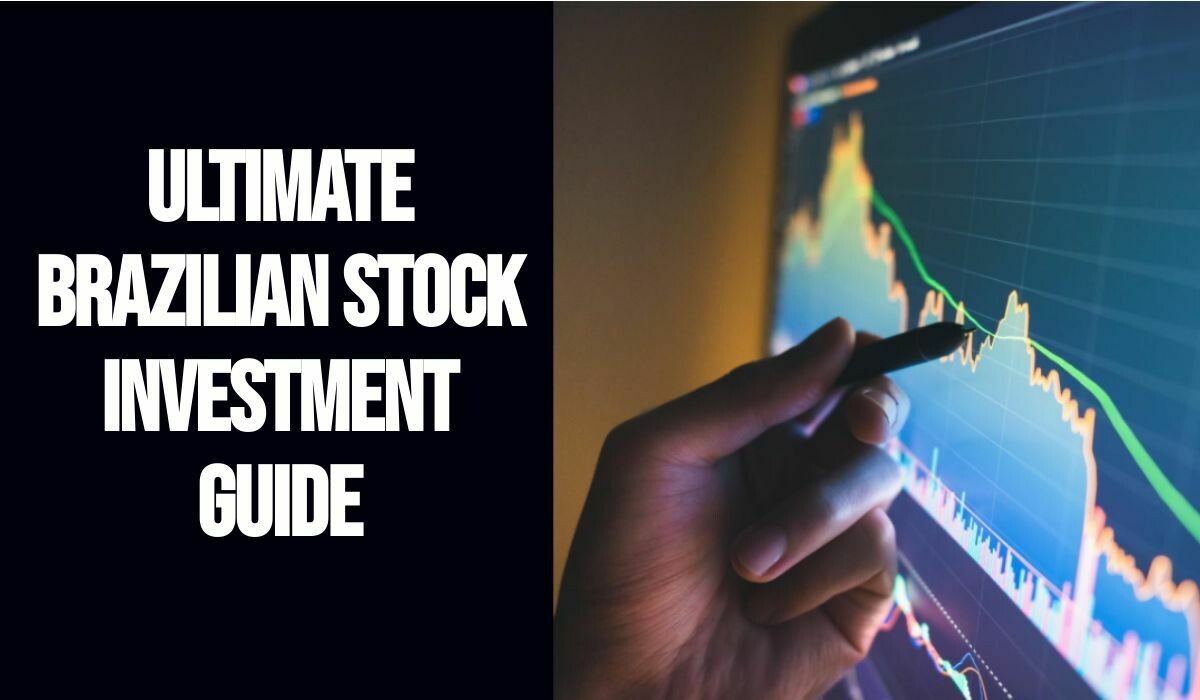Introduction
Investing in Brazilian stocks can be a lucrative opportunity for those looking to diversify their investment portfolio and tap into the growth potential of one of the largest economies in Latin America. With a vibrant stock market and a wide range of companies across various sectors, Brazil offers investors the chance to capitalize on its dynamic business environment.
However, before diving into the world of Brazilian stocks, it is crucial to understand the intricacies of the Brazilian stock market, conduct thorough research on potential investments, and adopt the right investment strategy. This guide will provide you with the necessary information and steps to navigate the process of investing in Brazilian stocks, from opening an account with a Brazilian brokerage firm to managing risks and building a diversified portfolio.
Understanding the Brazilian Stock Market
What is the Brazilian Stock Market?
The Brazilian stock market, also known as B3 (Bolsa, Balcão, Brasil), is one of the largest and most important stock exchanges in Latin America. It plays a vital role in the Brazilian economy and offers various investment opportunities for both domestic and international investors.
Market Index
The main market index in Brazil is the Bovespa Index (Ibovespa), which represents the performance of the most actively traded stocks listed on the B3 exchange. This index serves as a benchmark for investors and provides an overview of the overall market sentiment.
Types of Securities
The Brazilian stock market offers various types of securities that investors can trade:
- Stocks (Ações): These represent ownership in a company and provide investors with the opportunity to participate in the company’s growth and profit.
- Exchange-Traded Funds (ETFs): These are investment funds that trade on the stock exchange and aim to replicate the performance of a specific index or sector.
- American Depositary Receipts (ADRs): These are certificates issued by U.S. banks that represent shares of foreign companies. ADRs enable investors to trade Brazilian stocks on U.S. stock exchanges.
- Fixed-Income Securities: These include government and corporate bonds, which offer fixed interest payments over a specified period.
Regulatory Framework
The Brazilian stock market operates under the supervision of the Brazilian Securities and Exchange Commission (CVM), which regulates and oversees market participants, ensuring transparency and fair practices. It’s important for investors to familiarize themselves with the regulations and comply with the necessary requirements.
Market Hours
The B3 exchange operates on weekdays from Monday to Friday. The regular trading session starts at 10:00 AM and ends at 5:00 PM local time (GMT-3). It’s worth noting that the market may have shortened trading hours or be closed on certain holidays or special occasions.
By understanding the Brazilian stock market and its various components, investors can gain the necessary knowledge to make informed investment decisions and tap into the potential opportunities it offers.
Researching and Analyzing Brazilian Companies
Understanding the Brazilian Economy
Before investing in Brazilian stocks, it is important to have a good understanding of the Brazilian economy. This will help you identify sectors and companies that have the potential for growth and profitability.
Start by researching the overall economic indicators and trends in Brazil. Look at the country’s GDP growth, inflation rate, interest rates, and unemployment rate. These factors can provide insights into the overall health of the economy.
Additionally, it is important to understand the government’s policies and reforms that may affect the business environment in Brazil. Keep an eye on regulatory changes, tax policies, and government initiatives that may impact specific industries.
Identifying Promising Sectors
Once you have a good understanding of the Brazilian economy, you can start identifying sectors that show promise for investment. Look for sectors that are poised for growth and have a positive outlook.
Consider sectors such as technology, renewable energy, healthcare, and consumer goods, which are experiencing rapid growth in Brazil. These sectors often offer opportunities for significant returns on investment.
Furthermore, research the competitive landscape within these sectors. Identify companies that have strong market positions, robust financials, and a track record of delivering consistent returns to shareholders.
Analyzing Individual Companies
Once you have identified promising sectors, it is time to dive deeper into individual companies. Look for companies that have a strong business model, competitive advantages, and a solid track record of financial performance.
Review company financial statements, including income statements, balance sheets, and cash flow statements. Pay attention to key financial ratios such as profitability, liquidity, and debt levels.
Additionally, analyze a company’s management team and their track record. Look for companies with experienced and competent management teams that have a clear vision for growth.
Consider using financial research platforms and tools to assist you in analyzing and comparing companies. These platforms often provide detailed information on financials, analysts’ reports, and industry trends.
Staying Informed
Investing in Brazilian stocks requires staying informed about market developments, company news, and macroeconomic factors. Subscribe to financial news outlets, read research reports, and follow social media accounts of reputable sources.
Stay updated on company earnings releases, regulatory filings, and announcements that may impact the companies you are invested in or considering investing in.
Additionally, consider joining investment forums or communities where you can discuss and exchange ideas with other investors. This can provide valuable insights and perspectives.
Remember, thorough research and analysis are key to making informed investment decisions in Brazilian stocks. Take the time to understand the Brazilian economy, identify promising sectors, analyze individual companies, and stay informed about market developments.
Opening an Account with a Brazilian Brokerage Firm
Once you have gained a good understanding of the Brazilian stock market and have identified the companies you want to invest in, the next step is to open an account with a Brazilian brokerage firm. Here are the steps to follow:
Research and Choose a Reputable Brokerage Firm
Before you begin the account opening process, it’s essential to research and choose a reputable Brazilian brokerage firm. Look for firms that have a solid reputation, good customer reviews, and a strong track record in the market. Consider factors such as fees, customer service, trading platforms, and educational resources offered by the brokerage firm.
Gather the Required Documentation
Once you have selected a brokerage firm, you will need to gather the necessary documentation to open an account. This typically includes a valid ID, proof of address, and a tax identification number. Make sure to have these documents ready to expedite the account opening process.
Fill Out the Account Opening Application
Most brokerage firms have an online application process for opening an account. Fill out the required information accurately and thoroughly. Be prepared to provide personal information, employment details, and financial information during the application process.
Submit the Application and Required Documents
After completing the account opening application, submit it along with the required documents to the brokerage firm. Some firms may require you to submit physical copies of the documents, while others may accept scanned copies or digital uploads. Follow the instructions provided by the brokerage firm to ensure a smooth and efficient account opening process.
Fund Your Account
Once your account has been approved and opened, it’s time to fund it. You can transfer funds from your bank account to your brokerage account using various methods, such as wire transfer or electronic funds transfer. Follow the instructions provided by the brokerage firm to initiate the fund transfer and ensure that your account is adequately funded for investment.
Familiarize Yourself with the Trading Platform
Before you start trading, take the time to familiarize yourself with the trading platform provided by your brokerage firm. Each platform may have different features, tools, and functionalities. Explore the platform’s interface, learn how to place trades, set up alerts, and access market information. This will enable you to make informed investment decisions and navigate the platform with ease.
Opening an account with a Brazilian brokerage firm is an important step towards investing in Brazilian stocks. Follow these steps carefully, and once your account is set up, you’ll be ready to start investing in the exciting Brazilian market.
Choosing the Right Investment Strategy for Brazilian Stocks
Determine Your Investment Goals
Before investing in Brazilian stocks, it is important to determine your investment goals. Are you looking for long-term growth, income generation, or a mix of both? Understanding your objectives will help you choose the right investment strategy.
Consider the Economic and Political Climate
The economic and political climate in Brazil can significantly impact the performance of its stock market. Stay informed about the country’s economic indicators, political stability, and any regulatory changes that may affect the business environment. This information will help you make informed investment decisions.
Evaluate Different Investment Approaches
There are different investment approaches you can consider when investing in Brazilian stocks. Some common strategies include value investing, growth investing, and index investing. Evaluate each approach based on your risk tolerance and investment goals.
Assess the Company’s Fundamentals
When choosing individual Brazilian stocks, it is essential to assess the company’s fundamentals. Look at factors such as revenue growth, profitability, debt levels, and market share. You can use financial ratios and company reports to evaluate the company’s overall health.
Diversify Your Portfolio
Diversification is crucial when investing in any stock market, including Brazil. By spreading your investments across different sectors and companies, you reduce the risk of significant losses due to the underperformance of a single stock or sector. Consider investing in a mix of large-cap, mid-cap, and small-cap stocks to achieve diversification.
Monitor and Rebalance Your Portfolio
Once you have invested in Brazilian stocks, it is important to regularly monitor your portfolio’s performance. Keep track of company news, financial reports, and economic updates that may impact your investments. Additionally, rebalance your portfolio periodically to ensure it aligns with your investment strategy.
Seek Professional Advice
If you are unfamiliar with investing in Brazilian stocks or feel overwhelmed by the process, it may be beneficial to seek professional advice. A financial advisor with expertise in international markets can guide you in selecting the right investment strategy and help you navigate the Brazilian stock market.
Investing in Brazilian stocks can be a rewarding endeavor with proper research and a well-thought-out investment strategy. By determining your goals, considering the economic and political climate, evaluating different approaches, assessing company fundamentals, diversifying your portfolio, monitoring and rebalancing, and seeking professional advice when needed, you can increase your chances of success in the Brazilian stock market.
Conclusion
Investing in Brazilian stocks can be a lucrative opportunity for both domestic and international investors. By understanding the Brazilian stock market, conducting thorough research on Brazilian companies, and opening an account with a reputable brokerage firm, investors can take the first step towards tapping into the potential of this emerging market.
When investing in Brazilian stocks, it is important to choose the right investment strategy based on your financial goals and risk tolerance. Whether you opt for a long-term buy-and-hold approach or a more active trading strategy, it is crucial to diversify your portfolio to manage risks effectively. This can be achieved by investing in a variety of sectors and companies across different market caps.
While the Brazilian stock market offers significant growth potential, it is essential to be aware of the risks associated with investing in this market. These can include political instability, currency fluctuations, and economic volatility. By staying informed, carefully managing your investments, and seeking guidance from financial professionals, you can navigate these risks and maximize your chances of success in the Brazilian equity market.
FinBrain Technologies
www.finbrain.tech
[email protected]
99 Wall St. #2023 New York, NY 10005
Twitter • LinkedIn • Instagram • Facebook


Leave a Reply